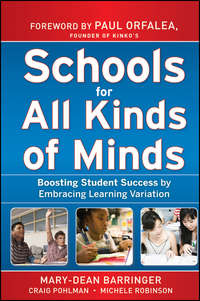Michele Robinson - Schools for All Kinds of Minds. Boosting Student Success by Embracing Learning Variation

This book shows how schools can–and must–develop expertise in «learning variation» (understanding how different kinds of minds learn) and apply this knowledge to classroom instruction in order to address the chronic learning challenges and achievement gap faced by millions of students. Barringer shows how using what we know about learning variation with a focus on discovering learning strengths, not just deficits, can help schools create plans for success for those students who often find it elusive. The book specifically addresses how school leaders can incorporate this knowledge into instructional practice and school-level policy through various professional development strategies. Schools for All Kinds of Minds: Provides a readable synthesis of the latest research from neuroscience, cognitive science, and child and adolescent development as it relates to understanding learning and its many variations. Links this information to strategies for understanding struggling learners and adapting school practices to accommodate a wider array of learning differences in a classroom. Demonstrates how this understanding of learning variation can change the way teachers and others help students succeed in various academic and content areas and acquire necessary 21st century skills. Includes discussion questions and facilitator guidelines for staff developers and teacher education programs; downloadable forms that accompany exercises from within the book; an action plan for schools to implement the ideas found in the book; and more.










